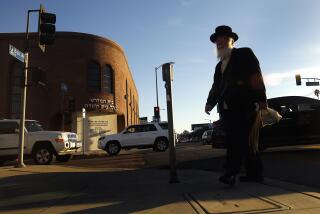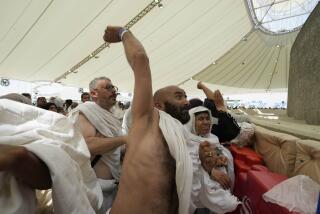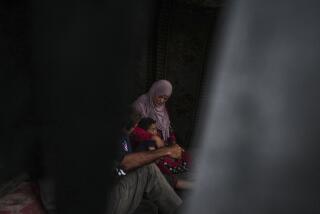Feast for the Soul
- Share via
GARDEN GROVE — The calendar showed the new moon would appear Tuesday night, but to be sure, Muzammil H. Siddiqi sent nearly a dozen planes above the clouds on Monday to search for it. As president of the Islamic Society of North America, the Cal State Fullerton professor couldn’t take any chances.
As it turned out, the moon appeared on time, marking a new month on the Islamic lunar calendar and setting off one of the most spiritual periods of the year for America’s estimated 6 million Muslims--Ramadan.
Starting this morning and until the next new moon is sighted, Muslims will fast from sunrise to sunset, abstaining also from sex, conflict and impure thoughts. They will gather every evening, for communal feasts, prayer and readings from the holy book, the Koran.
And through the month, as they test their willpower, followers of the prophet Muhammad hope to strengthen their faith and compassion. “A lot of people will tell you at the end of the month, they feel so much stronger or at least in control of themselves,” said Hussam Ayloush of Anaheim.
Ayloush, an aerospace designer raised in Lebanon, and his wife, Arwa, who was born Vilma Avila in the Texas border town of Laredo, are among thousands of practicing Muslims in Orange County. Estimates of the county’s Islamic population range widely from 70,000 to 150,000, the latter figure from the Islamic Society of Orange County.
Religion means everything to the Ayloush couple: It dictates their conduct toward each other and their two children. It tells them how to dress, how to manage their finances, how to be good neighbors. It even spells out what and how they will eat.
Ramadan simply intensifies this all-encompassing relationship, said Ayloush. “You’re not supposed to lie or do harm anyway,” he said. “But this month, you are always reminded of it by your hunger.
“Wherever you go, you are hungry, and so you are reminded that you are worshiping God. That’s one reason this is the month Muslims donate the most money, to orphans, the needy, the homeless. Donations probably increase tenfold, because people can relate to the hunger and the thirst.”
Muslims also believe the rewards of good deeds and generosity are multiplied during this period--one reason many followers choose to pay all of their annual 2.5% tithe this month.
Although Ramadan requires 30 days of sacrifice, the observance is harder for some than others.
“I have lived in this country for 30 years, and to be honest, I have never found it difficult,” said Haitham Bundakji, chairman of the board of the Islamic Society of Orange County and a native of Jordan, who will miss most his daily cup of tea.
“But I know some heavy smokers who really must restrain themselves,” he said. “My brother, for instance, smokes five packs a day any other time, but he won’t smoke during daylight this month. That’s the purpose behind fasting--showing self-restraint while you’re alone with God. When you restrain yourself from any lusts or desires, it builds confidence in yourself and shows your love of Allah.”
The Islamic faith recognizes a series of prophets, including Moses, Noah and Jesus Christ, as well as Muhammad, who lived in the 7th century and received the holy teachings that became the Koran.
It is the Koran that dictates the month of fasting, although all the prophets were known to have gone through periods of fasting to strengthen their faith, Ayloush said.
The holy period begins after the first sighting of the new moon in the ninth month of the Islamic calendar. That month moves forward by about 11 days every year, so that Ramadan is practiced equally in summer and winter.
Practitioners don’t leave anything to chance--or to the predictions of science. That’s why Siddiqi, who presides over the largest Islamic organization in the United States, sent planes into the sky from sites across the United States on Monday night.
If a single occupant had sighted the moon, Ramadan would have started Tuesday instead of this morning.
“Our phones were ringing like crazy all night, at the Islamic Society, my home, my pager,” Bundakji said. “Everyone wanted to know if it’s Ramadan. Every year, it’s the same thing.”
Ramadan also adds a night prayer, known as taraweeh, to the five daily prayers expected of practicing Muslims.
But the month is not completely one of denial and somber religious observance. Ramadan also is a month for reconnecting with old friends, visiting a number of mosques and religious centers, and hosting large communal meals.
“It would be considered very lonely for a family to eat by itself during this period,” said Ayloush, who, with his wife, prepares a schedule of dinner guests for the month.
The Islamic religion community is growing in Orange County, and with it has come an awareness and acceptance of Ramadan.
“There is more flexibility all the time,” said Muhammad A. Auwal, a communications professor at Cal State Los Angeles who lives in Fullerton. “In the class I teach at night, I usually stop after sunset to break my fast with a date and a glass of water and my students understand.”
Auwal was raised in Bangladesh and recalls processions of singing neighbors waking his family for night prayers during Ramadan. Here, where Muslims are a minority, practitioners can’t depend on that kind of peer support. But those who truly believe don’t need it, he said.
More to Read
Sign up for Essential California
The most important California stories and recommendations in your inbox every morning.
You may occasionally receive promotional content from the Los Angeles Times.










